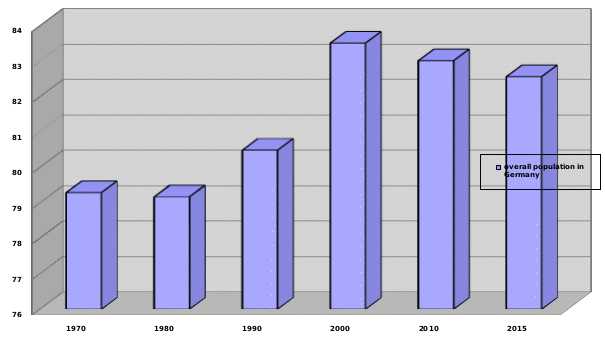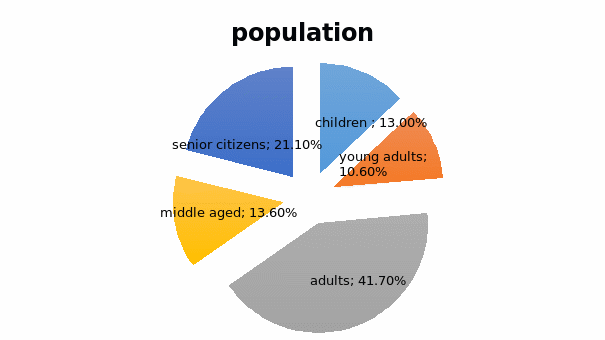Introduction
King Faisal Specialist Hospital and Research Center is one of the well-known Arabian hospitals treating patients with genetic diseases, supporting organ transplantation and activities. This organization is planning to enter a German market; therefore, there is a need to analyze the effectiveness of the chosen market and explain the peculiarities of the further entrance.
One of the Ghemawat’s frameworks, CAGE, will be used to achieve the desirable goal and understand why Germany is the country to pay attention to. Is it because of the fact that it is the largest population in the European Union? Or are there any other reasons connected with the economic development of the country?
The current project aims at answering these and many other questions as well as presenting credible facts about Germany as one of the countries for King Faisal Specialist Hospital and Research Center to cooperate with taking into consideration the insights the chosen organization prefers to rely on.
Cultural Distance
Germany and Saudi Arabia have rather different cultural preferences and traditions that should be identified to promote a successful business entrance to the country. The following table consists of several important cultural differences crucial for both countries.
Administrative Distance
The governmental structures of the countries under analysis are also different and have to be analyzed properly by the KFSH&RC to realize and be ready for the challenges and opportunities while entering the chosen sphere of life. As a rule, an administrative perspective touches upon the conditions of the governments of the countries and various political factors that may influence the development of the healthcare or research spheres.
Geographic Distance
The geographic differences between Saudi Arabia and Germany are obvious. There is a burning necessity not only to compare but also to identify the possibility to integrate the differences and create a necessary door to be opened while entering the chosen market. The following geographic factors have to be considered by KFSH&RC.
Economic Distance
The connection between the economic and healthcare factors is evident in both countries. The better and more stable the economic systems of the countries are, the better conditions people have to improve their health. The list of the economic facts is offered in the table below.
Insights Relevant to KFSH&RC Business
The evaluation of the current population statistics in Germany shows that there are no significant changes, and the number of people living in the country is about 80 million.

Though the Millennium was rich for Germany, nowadays, the country loses its rating as the most populated region in the European Union (Worldometers 2015). Therefore, it is necessary to pay more attention to the composition of the German population and understand what type of people is in need of medical professional help.

There are not many children, who do need health care from other countries. At the same, the existed amount of adults and middle-aged people may be a solid basis for KFSH&RC to promote their services in treating cancer and offer various transplantation operations. The income levels depend on the region where people live.
Still, taken into consideration that more than 60% of Germans live in urban areas, their incomes are high indeed to promote themselves with the necessary health care treatment. The nature of Germans is particular indeed; not many people are able to understand the way of how a German person thinks and estimates the conditions around. However, it turns out to be clear that the Germans will never neglect their health and do everything to achieve the best conditions they have.
Conclusion and Recommendations
In general, the evaluation of cultural, administrative, geographic, and economic factors in regards to the German healthcare sector proves that the country under analysis is rich indeed but faces certain problems with population growth. The number of people living in Germany does not define the quality of healthcare offered.
There are certain private and public healthcare sectors that provide people with the required portion of treatment and health insurance. On the one hand, Germany is the country that can allow such organizations like KFSH&RC entering the market spending fewer efforts and costs.
On the other hand, it is hard to be sure that KFSH&RC can stay in the country for a long time. As soon as the Germans get disappointed with the services offered or find its unimportance, KFSH&RC may have low ratings and incomes. The company may be weak in comparison to some new entrants to the same sphere of life.
Therefore, a number of recommendations may be given to KFSH&RC with its intentions to enter the healthcare market in Germany. The only point that has to be mentioned is that KFSH&RC should be ready for challenges and possible disappointments while cooperating with Germany and its people.
The recommendations are:
- KFSH&RC has to develop powerful advertisements to introduce its services to people of different age and with different incomes.
- KFSH&RC has to set several short-term goals and one long-term goal to be achieved within a certain period of time. It is wrong for KFSH&RC to set high prices for its services. It is more important to attract as many people’s attention as possible.
- KFSH&RC should consider the nature of Germans and be ready to explain that they do not want to substitute the German facilities just to offer a new approach for a healthcare sector.
List of References
2015 Index of economic freedom 2015, Germany. Web.
Clarke, E & Bidgood, E 2013, ‘Healthcare systems: Germany’, Civitas. Web.
IPB 2015, Germany: Healthcare sector organization, management and payment systems handbook. Lulu.com, Washington, DC.
‘Saudi Arabia vs. Germany’, 2015, FindTheData. Web.
Worldometers 2015, Germany Population. Web.